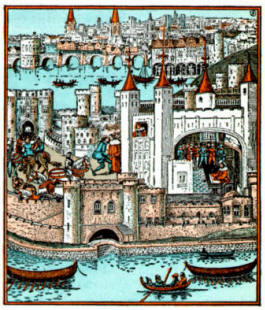Famous for being a pretender to the English throne
Born – Not known
Parents – Not known – Warbeck claimed parentage – Edward IV, Elizabeth Woodville
Siblings – Not known
Married – No
Children – None
Died – 23rd November 1499, Tyburn London, hanged
In 1483 Edward IV had died. He left two sons, Edward and Richard aged 12 and 10. Edward became king but because he was too young to rule his uncle Richard duke of York was to act as regent. The boys were put in the tower of London to await Edward’s coronation but disappeared sometime in the Summer of 1483. Richard took the crown as Richard III.
In 1485 Henry Tudor defeated and killed Richard of York at the Battle of Bosworth Field and became the first Tudor king Henry VII.
In 1491 Warbeck, who was working for Pierre Jean Meno, a silk merchant, travelled to Cork, Ireland. Ireland had traditionally supported the house of York and seeing this young man dressed in fine silk believed him to be a person of royalty. Warbeck’s claim that he was Richard of York, younger of the two princes in the Tower was believed.
In 1492 Warbeck’s claim was accepted by Charles VII of France and Margaret of Burgundy, sister of Edward IV and Richard III.
In 1495 Warbeck attempted to land in Kent, but found little support for his cause and when 150 of those who had sailed with him were arrested he abandoned the attempted landing. Instead he sailed for Ireland. After an unsuccessful attempt to take the town of Waterford which was loyal to Henry VIII, Warbeck fled to Scotland.
In Scotland, James IV accepted Warbeck and gave him support to invade England. In 1496 Warbeck invaded the north of England but finding little support returned to Scotland. James IV of Scotland realised that he had more to gain from making peace with England than supporting Warbeck’s claim and withdrew his support. Warbeck returned to Ireland.
In 1497 Warbeck landed in Cornwall and received some support from the people, angered by recent tax increases. He advanced on Taunton and Exeter but failed to take either town. In August 1497 he was forced to surrender to the King’s troops. As a foreigner Warbeck could not be charged with treason so Henry decided to allow him to remain at court under supervision.
In 1498 Warbeck tried to run away. He was caught and sent to the Tower of London. After trying to escape from the Tower Henry VII ordered his execution and Warbeck was hanged on 23rd November 1499.
Cite This Article
"Perkin Warbeck" History on the Net© 2000-2024, Salem Media.
April 25, 2024 <https://www.historyonthenet.com/perkin-warbeck>
More Citation Information.






